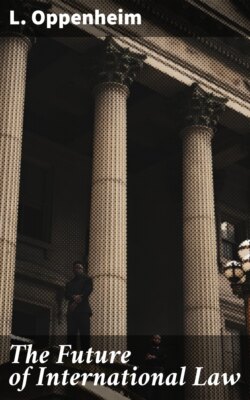Читать книгу The Future of International Law - L. Oppenheim - Страница 10
На сайте Литреса книга снята с продажи.
CHAPTER I
THE ORGANIZATION OF THE SOCIETY OF STATES
ОглавлениеTable of Contents
Is the law of nations an anarchic law?
13. International legislation and administration presuppose the existence of law and order within the society of states, and this latter topic must therefore be treated before the former. International law has been called 'anarchic law' on the ground that hitherto the society of states has not been organized and that it must ever remain unorganized on account of the complete sovereignty of its members. It seems to me that this position is untenable. The idea of anarchy forms a contrast to that of law. Law can as little be anarchic as anarchy can be an institute of law. The conception of the one excludes the other. He who cannot conceive of law apart from a superior power enforcing it on its subjects, may perhaps call the international society of states anarchic, but then he will also have to contest the existence of an international law, and, logically, he should also deny the possibility of the existence of an international society.
All law is order.
14. He, however, who identifies law and order, and who, whenever he finds in any society rules making their appearance which are conceived as compulsory for the conduct of its members, speaks of law—in contrast to morality, the observance of which is left to the conscience of the members—will also be able to speak of law in a society where there is no relation of superior and subject, provided only that the relation between the members is regulated in an ordered manner. That the international society of states is orderly regulated after this wise will be denied by no one who looks at it without prejudice, and who does not confuse order in a society with order of such a kind as is maintained by special organs of the society in question.
The family of nations is a society ruled by law although it does not as yet possess special organs.
15. The admission that hitherto the international society of states has not possessed any special organs, is not an admission that it has not been an ordered society. Quite the contrary is the case, for numerous rules may be pointed to which show that that society is an ordered one. There are the rules which relate to the independence of each state of all other states, to the equality of all states, to their supremacy both personal and territorial, and to their responsibility; and in addition there are those rules which, exceptionally, allow, or at any rate excuse, certain inroads on the legal sphere of other states. And the admission that hitherto this society has possessed no permanent special organs is not an admission that no ways and means are available for the maintenance of existing order and for the formation of more thoroughgoing order, and for the development of a quasi-legislative and administrative activity. Here, too, quite the contrary is the case. Every state has possessed and possesses numerous organs for its international relations, these relations are governed by international conventions and international custom, and numerous congresses and conferences assemble from time to time, when it is a question of making international arrangements of a more general character. In this way it has been possible, even without permanent organs of the international society, to increase and multiply the rules of the law of this society. It does not follow, however, that this society would not attain its aims better than in the past, if it were able to convert itself from an unorganized into an organized society.
